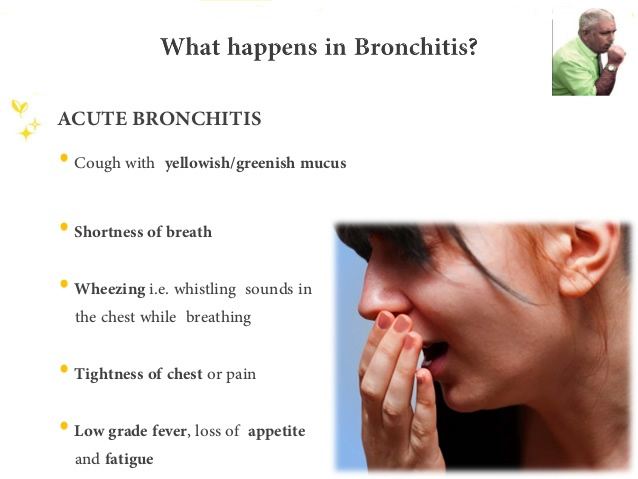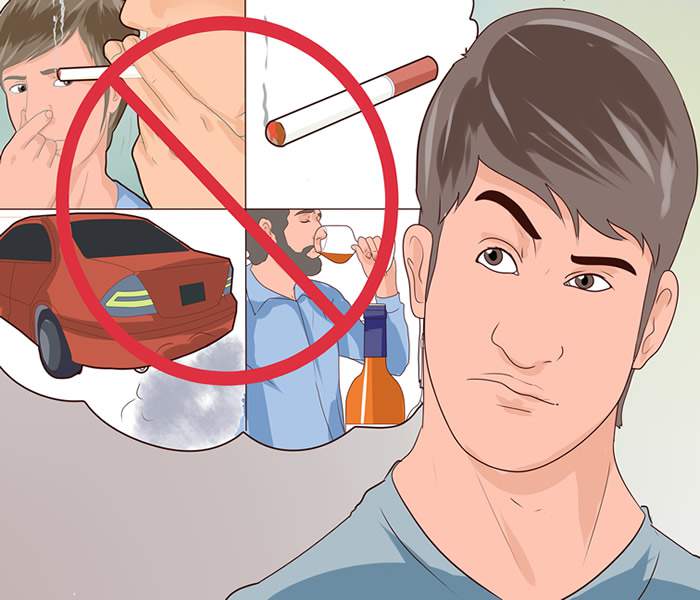Bronchitis
What Is Bronchitis?
Bronchitis is an infection that affects the bronchi or tubes that carry air to the lungs. It causes a noisy cough, often with mucus or phlegm.
Bronchitis is usually caused by a virus, so antibiotics do not generally help. Use antibiotics only if the bronchitis lasts more than a week and there no improvement.
It can be described as inflammation of the mucous membrane in the bronchial tubes. It typically causes bronchospasm and coughing.
Types of Bronchitis

- Acute Bronchitis
- Chronic Bronchitis
Chronic bronchitis: is a serious, ongoing illness characterized by a persistent, mucus-producing cough that lasts longer than three months
Causes of Acute Bronchitis
A shorter illness that commonly follows a cold or viral infection eg flu
The bacterium that causes whooping cough can also cause acute bronchitis.
This bacterium is called Bordetella pertussis.
Smoking cigarette could also cause it
Causes of Chronic Bronchitis
Chronic bronchitis is one type of chronic obstructive pulmonary disease. The inflamed bronchial tubes produce a lot of mucus. This leads to coughing and difficulty
Chronic bronchitis is caused by repeated irritation and damage of the lung and airway tissue
Cigarette smoking is the most common
Breathing in air pollution, fumes, or dust over a long period of time may also cause it.
People often develop acute bronchitis after a viral chest infection.
Symptoms/Signs of Chronic Bronchitis
The primary symptom of acute bronchitis is a cough.
Nasal congestion
Headache
Sore throat
A cough, with mucus that lasts for weeks or months
Cough that gets worse and leads fever
It occurs most frequently in older persons who have been heavy smokers.
Chest discomfort
Production of mucus (sputum), which can be clear, white, yellowish-gray or green in color in some occasions it may be streaked with blood
Fatigue
Shortness of breath
Slight fever and chills
Symptoms/Signs of Bronchitis for children
A runny nose
Mild fever
Cough up sputum or vomit mucus
Chronic cough, which may continue beyond 10 days and contain clear or colored mucus
Shortness of breath
Wheezing
Chest pain
Chest tightness
Sore throat from persistent coughing
NOTE:
In many cases, acute bronchitis will go away on its own
Antibiotics cannot treat viral bronchitis.
How to diagnose Bronchitis
Acute bronchitis is diagnosed by the patient's history
Conduct a detailed physical examination
Tests (fluid eg saliva or mucus).
How to Prevent Chronic Bronchitis
Avoid other things that can irritate your lungs like Perfumes, Hairspray, spray deodorant and spray paint.
Avoid breathing in dust or chemical fumes.
Wear a mask over your nose and mouth if you are using paint or paint remover,
Do not use anything with strong fumes.
How to Prevent Acute Bronchitis
Adequate rest is very important
Inhale moist air from a hot shower so that the mucous remains moist and can be sneeze out easily
In order to calm down dry throat due to the infection take suck cough tablets
Medications like acetaminophen, ibuprofen, etc. can be used for fever and body pains
Consumption of adequate fluids is beneficial
Take cough medication

Treatment for Bronchitis
Taking paracetamol, ibuprofen, or aspirin to reduce high temperature (fever) and to ease any aches, pains and headaches. (Children aged under 16 should not take aspirin.)
Having lots to drink if you have a fever, to prevent mild lack of fluid in the body (dehydration).
If you smoke, trying to stop for good. Bronchitis, chest infections and serious lung diseases are more common in smokers.
Home Remedies/Home Cure for Bronchitis
You can use painkiller like aspirin, ibuprofen and naproxen to soothe your sore throat.
Humidifiers create moisture in the air you breathe. This can help loosen mucus in your nasal passages and chest, making it easier to breathe.
Drinking a lot of warm water or fluid, such as water or tea to thin out mucus.
This makes it easier to cough it up or blow it out through your nose.
Factors that increase your risk of bronchitis are:
Cigarette smoke. People who smoke or who live with a smoker are at higher risk of both acute bronchitis and chronic bronchitis.
Low resistance. This may result from another acute illness, such as a cold, or from a chronic condition that compromises your immune system. Older adults, infants and young children have greater vulnerability to infection.
Exposure to irritants on the job. Your risk of developing bronchitis is greater if you work around certain lung irritants, such as grains or textiles, or are exposed to chemical fumes.
Gastric reflux. Repeated bouts of severe heartburn can irritate your throat and make you more prone to developing bronchitis.
Complications of Bronchitis
It can lead to emphysema, a very serious and Incurable condition in which the tiny air pockets of the lungs break down this would result into difficulty in breathing.
This condition makes it difficult for the person in question to experience difficulty in breathing
The chest becomes would become wide and big ‘like a barrel’.




